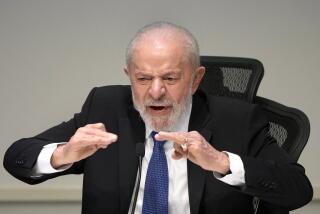Brazilian Voters Apparently Want a President--Not a Prime Minister or a King
- Share via
RIO DE JANEIRO — After a campaign that pitted presidential pretenders against would-be kings, Brazilians went to the polls Wednesday in a historic national referendum, apparently deciding by an overwhelming margin to maintain the political status quo.
While the final tally could take days, exit polls showed that voters ratified by a landslide the current republican system of government, run by a strong president.
In the two-tiered ballot, Brazilians rejected by a 5-to-1 margin (68% to 12%) a move to restore Brazil’s bygone monarchy and opted by a 2-to-1 majority (57% to 25%) to preserve the executive presidency, instead of handing over government to Parliament and a prime minister.
Scattered incidents occurred as police intervened in cities to control the throngs that lined up to vote at out-of-state balloting stations.
Crowing victory, the presidentialistas called the vote nothing less than the “refounding” of the Brazilian republic, formed 104 years ago when soldiers and intellectuals banded together to topple the monarch, Dom Pedro II.
The electorate did not share that enthusiasm. Though officials celebrated this show of “sovereign democracy,” no blaring horns or waving pennants filled the air in Rio, where, under a blazing sun and powder-blue sky, the beaches were more crowded than the voting booths.
An estimated 15% of the 90 million eligible voters stayed away from the polls, a high number for a country where abstention is punishable by stiff penalties; as many as 20% of voters had been expected to leave their slate blank or void their vote in protest.
Monarchists on Wednesday made a surprisingly strong showing. Nearly forgotten over the last century, Brazil’s royal family suddenly surged into national headlines, raised almost $1 million in contributions and claimed 12% of the ballots. “This is not nostalgia,” insisted Joao Henrique de Orleans e Braganca, prince regent, Pedro’s great-great-grandson and one of the dozen or so possible candidates for king. “People long for some system that works.”
Almost since it was born in 1889, the Brazilian republic was a lopsided affair, kept off balance by military intervention and the jockeying of rival elites. Presidents, when elected, were routinely plucked from power and swapped for puppets whenever crises reared.
Since World War II, only one elected president, Juscelino Kubitschek, managed to finish his term. One committed suicide, another quit. Last year, Fernando Collor de Mello was impeached. A handful of coups took care of the rest.
That intensified this scramble to market the latest remake of Brazil’s political system. Advocates for a presidential, parliamentary or monarchal system locked horns in a loud, often surly, sometimes comical television campaign.
To repair the republic, politicians now look to October, when the sprawling, complex 1988 constitution is up for revision.
Another future target for reform will be Brazil’s permissive party structure. Congress harbors fully 19 parties, more than in any other democracy.
Finally, the victory of the presidential system may make governing here even tougher. Already candidates are flexing their muscles for the presidency, which comes open in early 1995.
More to Read
Sign up for Essential California
The most important California stories and recommendations in your inbox every morning.
You may occasionally receive promotional content from the Los Angeles Times.













